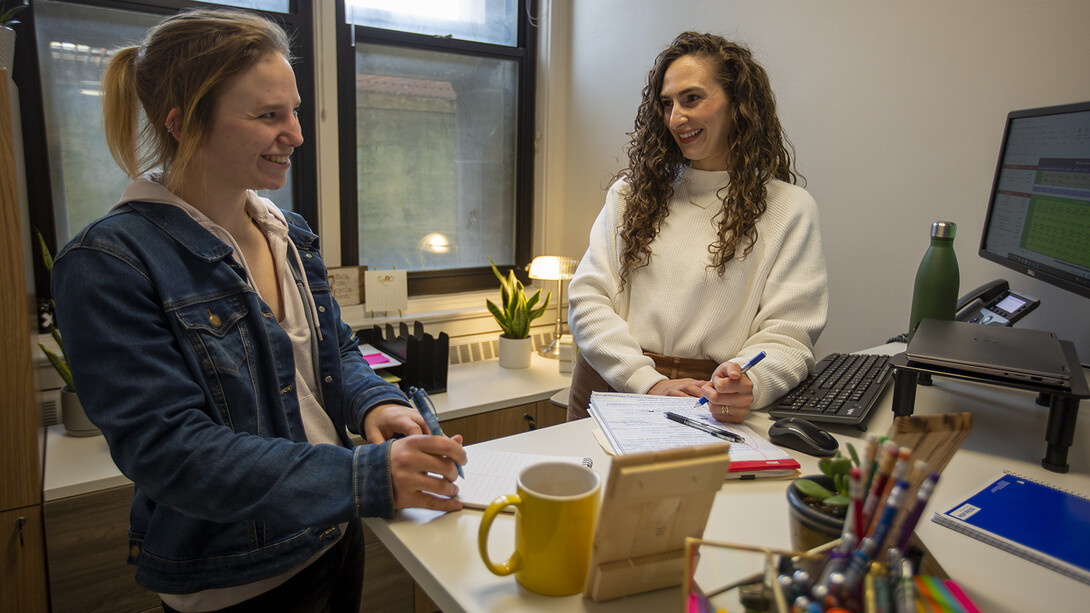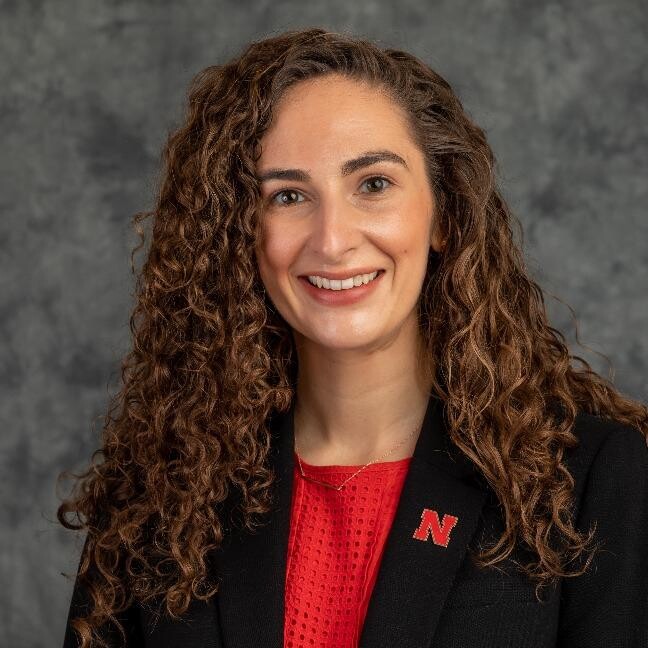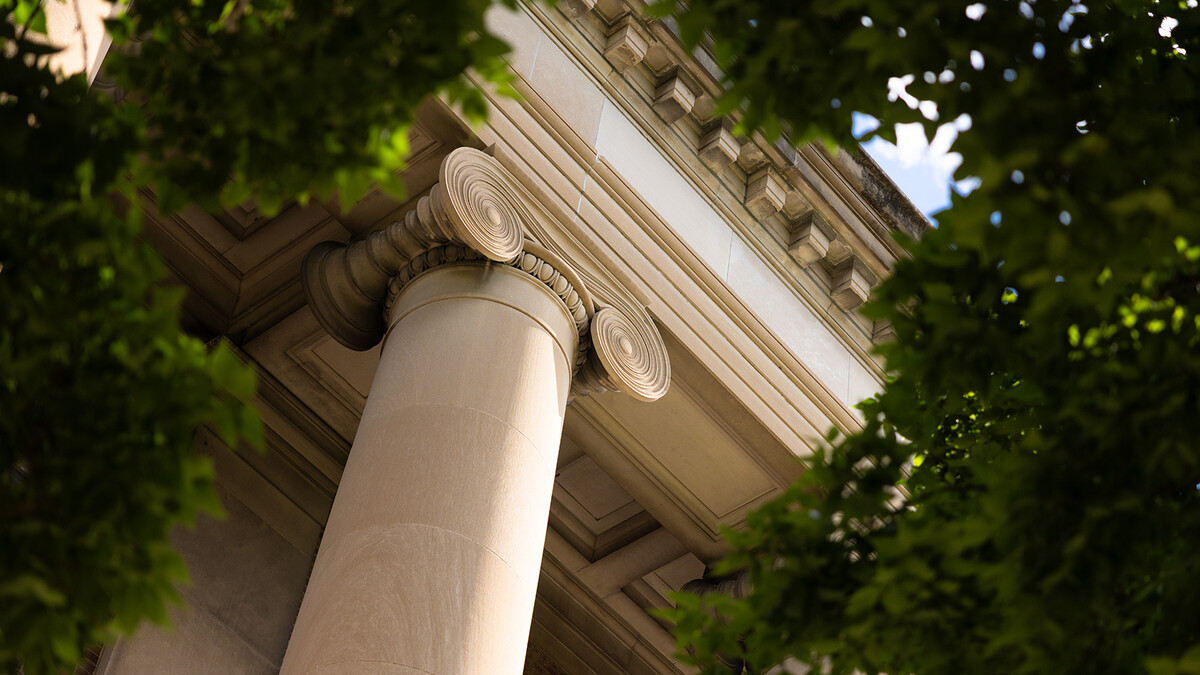
To further its impact on campus, the University of Nebraska–Lincoln’s Office of Sustainability has moved into a central location and hired a new coordinator.
Morgan Hartman, who has worked with campus sustainability since March 2020 and was highly involved in green initiatives as an undergraduate, has been named sustainability coordinator. Hartman will continue to oversee the recycling pilot project, which recently moved under the Office of Sustainability.
These changes, including a move to Canfield Administration Building, mark a new era for the office.
“Morgan Hartman has demonstrated that she has a passion for sustainability and that she really cares about the university and the type of progress we make on that front,” said Emily Deeker, director of campus planning and environment. “She was a great fit for where the office is at this time.”

Hartman was hired as the campus recycling coordinator in March 2020. Her role was to develop a comprehensive and efficient recycling program on campus. In 2021, she became the manager of the waste management operation on campus and has served as acting coordinator for the Office of Sustainability since September. Hartman is excited to continue to pursue her passion for sustainability at the University of Nebraska–Lincoln.
“I am honored and humbled by this opportunity to serve our university community as the sustainability coordinator,” Hartman said. “I am excited to use my prior experiences as a student leader and employee to positively impact our university community and make progress toward our goals. I look forward to elevating and building upon those areas where we currently see sustainability as well as the opportunity to collaborate with the university community through education, outreach and partnership.”
Originally from Shawnee, Kansas, Hartman is a 2017 Nebraska U graduate with a Bachelor of Science degree in natural resource and environmental economics, including a concentration in eco-business and sustainability and a minor in leadership and communication.
During her time at the university, she joined the Environmental Leadership Program and was accepted into the Environmental Sustainability Committee with ASUN. As a member of fraternity and sorority life, she founded Greeks Go Green and found opportunities to hone her passion and contribute positively to the university community
“The opportunities I had as a student leader were fundamental to my decision to pursue sustainability in my career,” Hartman said. “Now having the opportunity to lead efforts that will affect positive change for the institution that shaped me so significantly is very full circle and inspiring as I move into this new role.”
In her former role, Hartman created the recycling pilot project, which was aimed at the development of a standardized recycling operation within campus buildings. Data collected through waste audits and stakeholder feedback has shown that the pilot project has had a positive sustainable impact on the campus’s waste management and reduction goals since its implementation in 2020. Hartman will continue to oversee the recycling program as part of her new position.
The office is “currently evaluating opportunities for broadening the scope of the pilot project through future phased implementation of standardized waste containers and collection process alignment,” Hartman said.
The office’s new location will further provide opportunities for education and outreach, as they moved from a location near the outskirts of campus to the Canfield Administration Building near the heart of campus. This will give the office more visibility among students, a greater sense of connectedness with the campus, and assist the undergraduate and graduate students that work with the office.
To celebrate their new space, the Office of Sustainability is encouraging university community members to visit them in Canfield 59 on Tuesday, March 29, between 9 a.m. and 3 p.m. to pick up a reusable tote bag.
“Our office is very excited about the momentum surrounding sustainability across the NU system,” Hartman said. “With our recent move, we are better able to serve as a resource to the campus community and over the next few months, we will be focused on additional data collection and future planning related to our recycling pilot project, continued education and outreach within our campus community through the Sustainability on Wheels program, and collaboration with campus stakeholders to collect data for our upcoming STARS submission.”
The university’s STARS rating, which is the standard for sustainability reporting in higher education, has increased with each submission since its first in 2014. Achieving a gold STARS rating, which the office will apply for in April, is a top priority.
“As an office, we look forward to fostering a culture of sustainability among our campus community and promoting initiatives and activities that will further position us as a leader in sustainability both within the Big Ten and higher education nationally,” Hartman said.
“University Operations has worked diligently to build a team that is innovative, passionate and collaborative towards our commitment to our campus sustainability initiatives,” said Jim Jackson, associate vice chancellor of university operations. “At the same time, it is essential that we provide results that can be compared and measured to ensure that we are making progress. UNL has already gained national recognition for several energy-saving and technology achievements. I believe our recycling program will also be viewed by our peers as another best practice achievement we can add to our teams’ list of recognizable accomplishments.”
The office is continuing to focus on aligning its efforts with the strategic goals and initiatives outlined in the university’s 2020 Environment, Sustainability and Resilience Master Plan as well as the N2025 Strategic Plan and the N150 vision.
As part of the N150 vision and mission, the university strives to promote the environmental, social and economic well-being of Nebraska through the socially responsible stewardship of natural resources.
The N2025 Strategic Plan highlights that the responsible stewardship of resources requires organizational and operational effectiveness. It also requires a commitment to sustainability and proper investment in physical and technological infrastructure.
“While these are large endeavors, we are already making progress in many operational areas,” Hartman said. “We aim to further promote and develop in partnership with our campus stakeholders. Every person and every interaction matters, and I believe that educating UNL students, faculty and staff on ways they can individually contribute- whether that be through waste reduction and proper recycling habits, energy or water conservation, infusion of sustainability and resilience into the classroom and many more can ultimately create large, meaningful sustainable impact.”







